Unit 6 I'm watching TV. Section A 2a-2d 课件(22张PPT)
文档属性
| 名称 | Unit 6 I'm watching TV. Section A 2a-2d 课件(22张PPT) | 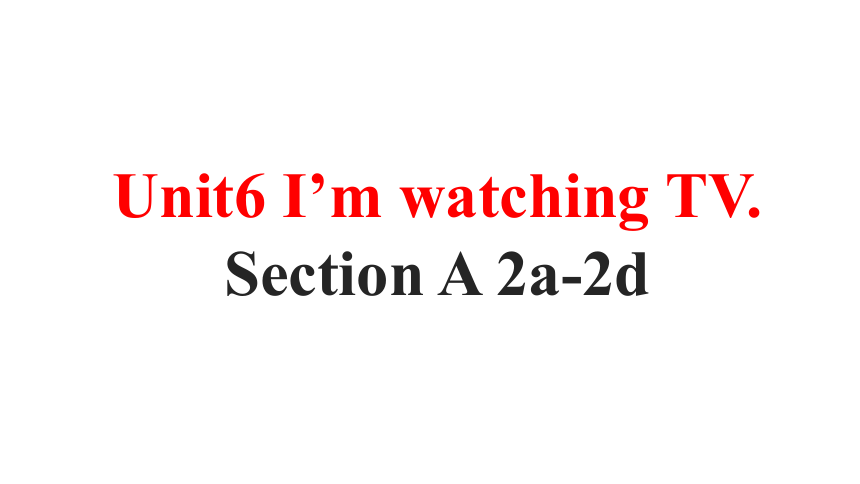 | |
| 格式 | pptx | ||
| 文件大小 | 1.7MB | ||
| 资源类型 | 教案 | ||
| 版本资源 | 人教新目标(Go for it)版 | ||
| 科目 | 英语 | ||
| 更新时间 | 2022-04-13 15:12:23 | ||
图片预览

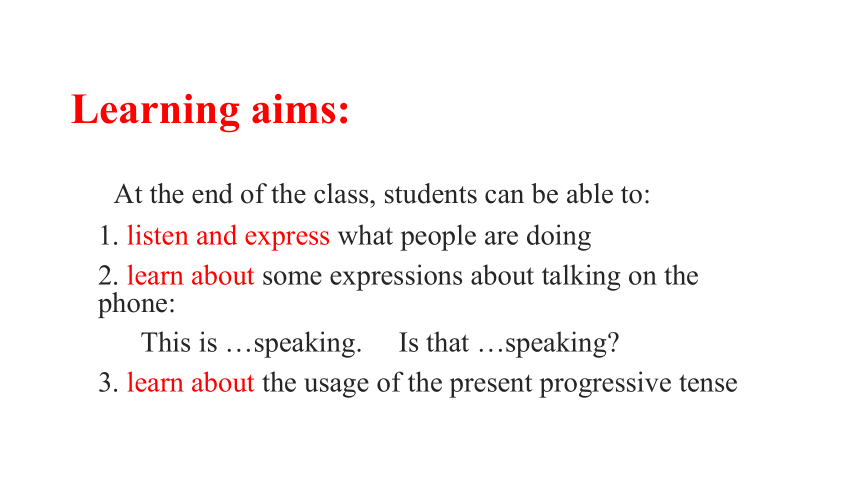
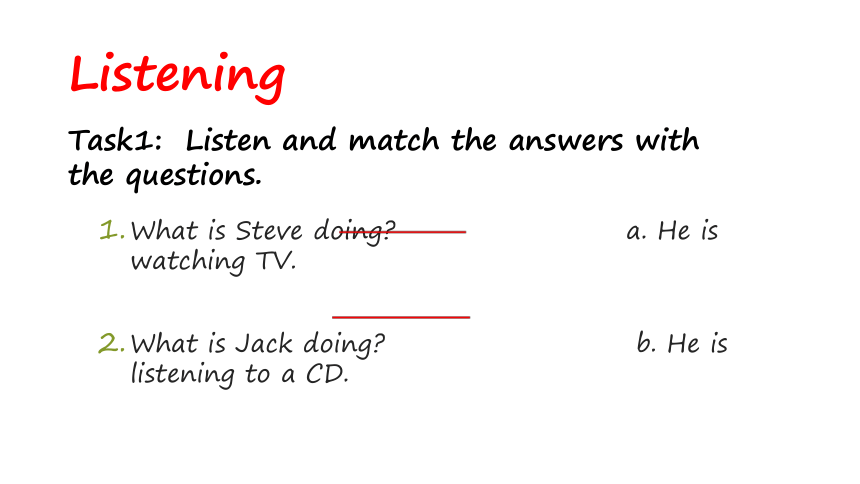
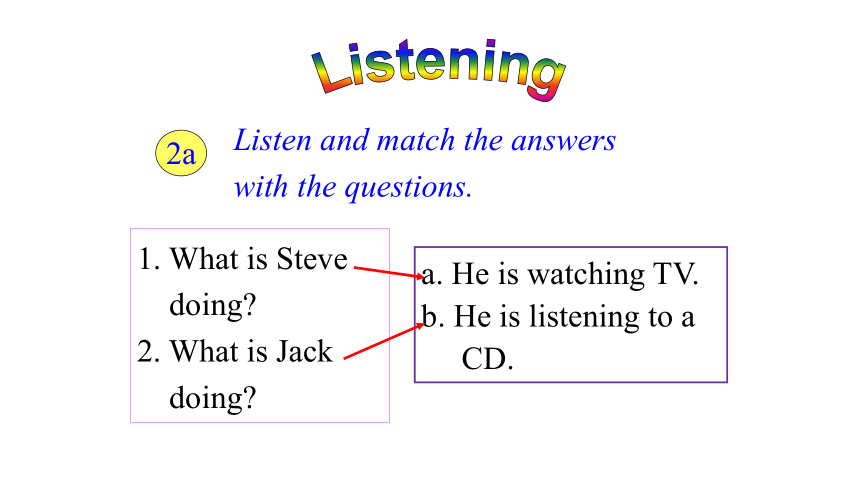
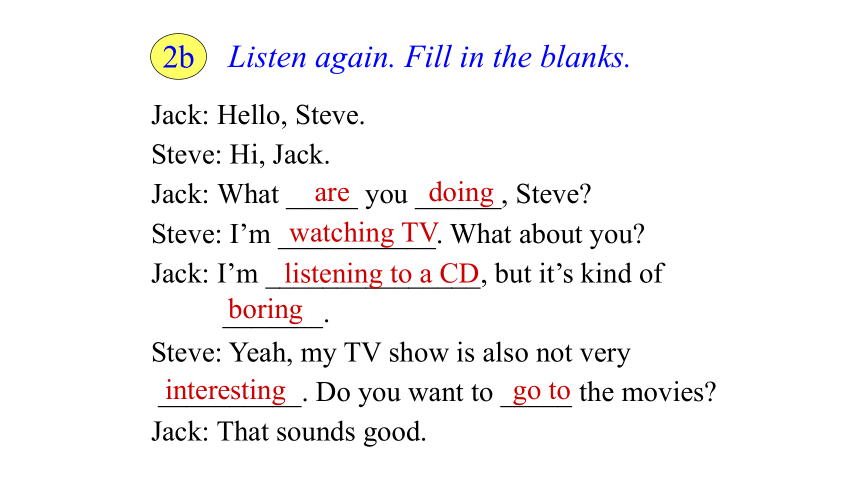
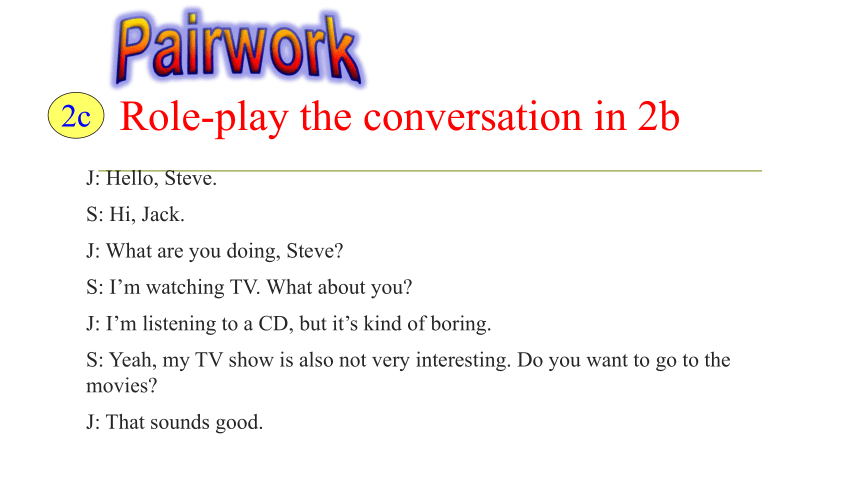
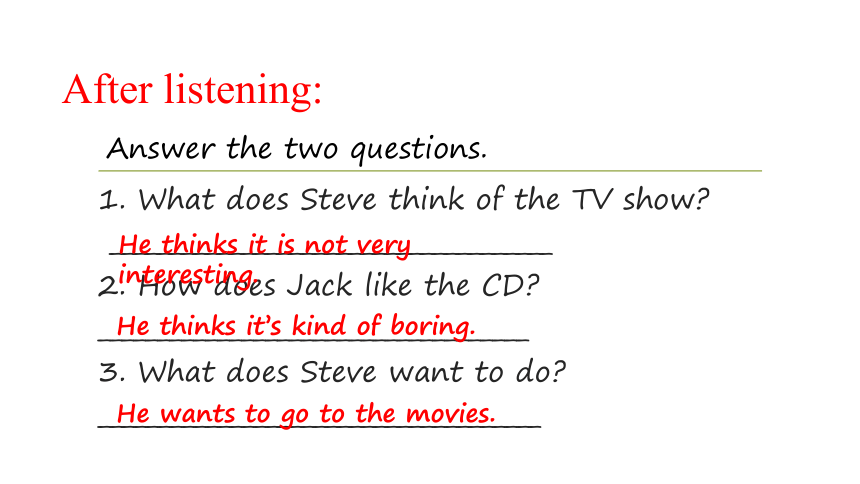
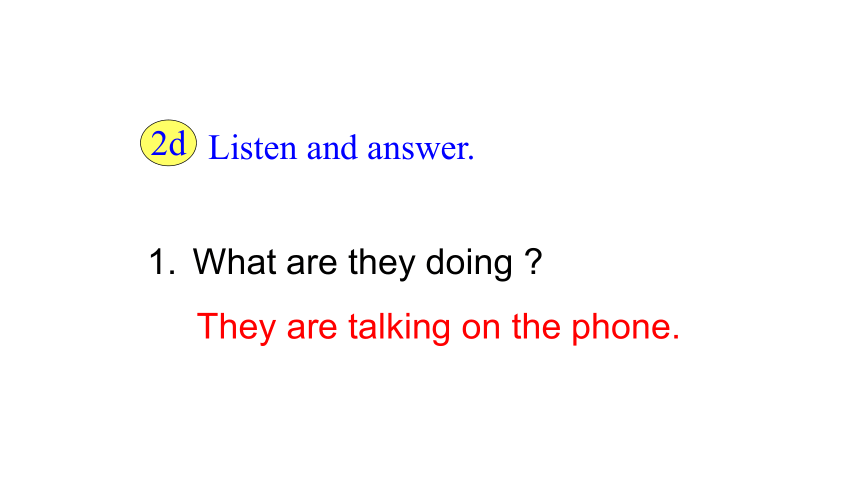
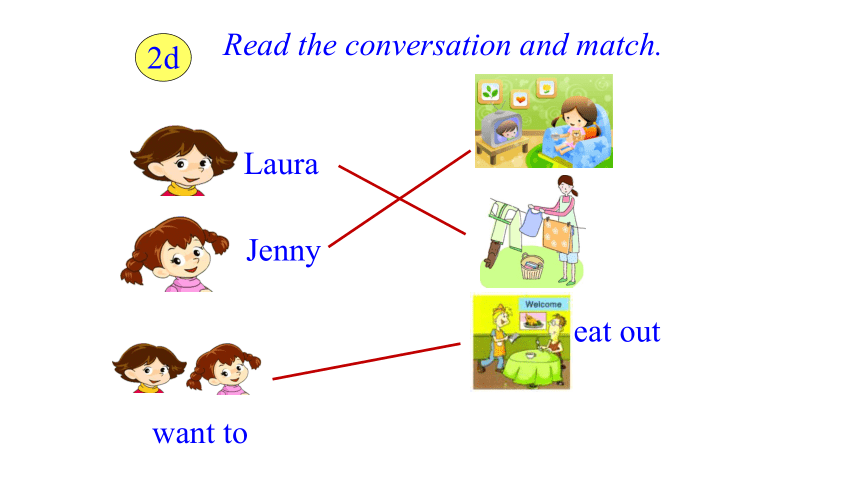
文档简介
(共22张PPT)
Unit6 I’m watching TV.
Section A 2a-2d
Learning aims:
At the end of the class, students can be able to:
1. listen and express what people are doing
2. learn about some expressions about talking on the phone:
This is …speaking. Is that …speaking
3. learn about the usage of the present progressive tense
Listening
What is Steve doing a. He is watching TV.
What is Jack doing b. He is listening to a CD.
Task1: Listen and match the answers with the questions.
1. What is Steve
doing
2. What is Jack
doing
a. He is watching TV.
b. He is listening to a
CD.
Listen and match the answers
with the questions.
Listening
2a
Jack: Hello, Steve.
Steve: Hi, Jack.
Jack: What _____ you ______, Steve
Steve: I’m ___________. What about you
Jack: I’m _______________, but it’s kind of
_______.
Steve: Yeah, my TV show is also not very
__________. Do you want to _____ the movies
Jack: That sounds good.
are doing
watching TV
listening to a CD
Listen again. Fill in the blanks.
boring
interesting
go to
2b
Role-play the conversation in 2b
J: Hello, Steve.
S: Hi, Jack.
J: What are you doing, Steve
S: I’m watching TV. What about you
J: I’m listening to a CD, but it’s kind of boring.
S: Yeah, my TV show is also not very interesting. Do you want to go to the movies
J: That sounds good.
2c
After listening:
1. What does Steve think of the TV show
_____________________________________
2. How does Jack like the CD
____________________________________
3. What does Steve want to do
_____________________________________
He thinks it is not very interesting.
He thinks it’s kind of boring.
Answer the two questions.
He wants to go to the movies.
Listen and answer.
2d
What are they doing
They are talking on the phone.
Read the conversation and match.
Laura
Jenny
eat out
want to
2d
Read the conversation and answer the questions.
1. What’s Laura doing
______________________________
2. What’s Jenny doing
_______________________________
3. What do they want to do
_______________________________
4. When are they meeting
_______________________________
She is washing her clothes.
She is watching TV.
They want to eat out.
They are meeting at half past six.
Free talk
Jenny and Laura are talking on the phone. Can you guess what they are doing
Language points:
1. 打电话用语
This is Jenny. ----我是Jenny。 It’s Laura here.
This is ……(speaking). It’s ……
Is that Jenny ----你是Jenny吗?
Is that ……(speaking)
2. I’m just washing my clothes.
am/is/are doing sth 正在做某事
just 为“副词”
3. Do you want to join me for dinner
join sb. for dinner 和某人一起吃晚饭
want to do sth 想要做某事
4. I’d love to.
我很乐意。
1) 交际用语,用于礼貌地接受他人邀请,还可以说成I’d like to,但语气比较弱。例如:
—Would you like to come with us to
the show
你愿意跟我们一起去看表演吗?
—Thanks. _________ 谢谢,我愿意。
I’d like to.
2) 当委婉拒绝他人邀请时,多用I’d love to, but...或Sorry, I’m afraid I can’t because...
—我看电影去,你想跟我一同去吗?
________________________________
________________________________
—真抱歉, 怕是不成了, 我还有好多作
业要做呢。
________________________________
________________________________
I’m going to movies. Would you like to join me
Sorry, I’m afraid I can’t because I
still have lots of homework to do.
—Hi, Li Xue. What _____
you _____
— I’m __________.
— What ___ your dad ______
— He’s ________ his car.
— What __ your mom _____
— She is _________ in the kitchen.
— What about your sister
— She’s _______ my mom.
are
doing
exercising
Look at the pictures and finish the conversation.
Exercises
is doing
cleaning
is doing
cooking
helping
1. 你好!我是李明。____________________
你好,李明。我是杰克。 _________________________
2. 你在做什么王芳?_______________________________
没什么。我在看报纸。
_________________________________
3. 你想和我们一起去吃晚饭吗?______________________________
Hello. This is Li Ming.
What are you doing, Wang Fang
Hi, Li Ming. It’s Jack here.
Not much. I’m reading a newspaper.
Do you want to join us for dinner
Translate the sentences.
1. My grandfather is reading. (改为否定句)
My grandfather ________ _______.
2. The beautiful girl is dancing now. (改为一般疑问句)
________ the beautiful girl ________ now
3. John is playing chess now. (对划线部分提问)
________ is John ________ now
isn’t reading
Is
dancing
What
doing
4. My sister is eating in the dining hall. (对划线部分提问)
________ ________ your sister eating
5. Peter runs every morning. (用now代替every morning改写句子)
Peter ________ ________ now.
Where is
is running
现在进行时的构成:主语 + be + v-ing...
一般现在时的构成:主语 + 动词.
时间状语常为usually, often, sometimes, on Monday, every day等等。
常见标志词为:
now, look, listen, It’s +时刻点.
这两种时态的区别是:
1.时间状语
2.动词的形式
Look!
They are drinking tea now.
He reads books every moring.
Are they drinking now
Yes, they are./No, they aren’t.
Does he read books every morning
Yes ,he does. / No,he doesn’t.
He doesn’t read books every moring.
They are not drinking tea now.
一般疑问句
否定句
否定句
一般疑问句
肯定/否定回答
肯定/否定回答
Summary:
1.重点单词和短语:movie,just,go to the movies,eat out;bike;
3.句型(1)—What +be动词+主语+V-ing?
—主语 +be动词+V-ing
(2)—Do you want to … ?
—Yes,I'd love to.
(3)打电话用语:—It’s+人名.
—This is +人名.
Unit6 I’m watching TV.
Section A 2a-2d
Learning aims:
At the end of the class, students can be able to:
1. listen and express what people are doing
2. learn about some expressions about talking on the phone:
This is …speaking. Is that …speaking
3. learn about the usage of the present progressive tense
Listening
What is Steve doing a. He is watching TV.
What is Jack doing b. He is listening to a CD.
Task1: Listen and match the answers with the questions.
1. What is Steve
doing
2. What is Jack
doing
a. He is watching TV.
b. He is listening to a
CD.
Listen and match the answers
with the questions.
Listening
2a
Jack: Hello, Steve.
Steve: Hi, Jack.
Jack: What _____ you ______, Steve
Steve: I’m ___________. What about you
Jack: I’m _______________, but it’s kind of
_______.
Steve: Yeah, my TV show is also not very
__________. Do you want to _____ the movies
Jack: That sounds good.
are doing
watching TV
listening to a CD
Listen again. Fill in the blanks.
boring
interesting
go to
2b
Role-play the conversation in 2b
J: Hello, Steve.
S: Hi, Jack.
J: What are you doing, Steve
S: I’m watching TV. What about you
J: I’m listening to a CD, but it’s kind of boring.
S: Yeah, my TV show is also not very interesting. Do you want to go to the movies
J: That sounds good.
2c
After listening:
1. What does Steve think of the TV show
_____________________________________
2. How does Jack like the CD
____________________________________
3. What does Steve want to do
_____________________________________
He thinks it is not very interesting.
He thinks it’s kind of boring.
Answer the two questions.
He wants to go to the movies.
Listen and answer.
2d
What are they doing
They are talking on the phone.
Read the conversation and match.
Laura
Jenny
eat out
want to
2d
Read the conversation and answer the questions.
1. What’s Laura doing
______________________________
2. What’s Jenny doing
_______________________________
3. What do they want to do
_______________________________
4. When are they meeting
_______________________________
She is washing her clothes.
She is watching TV.
They want to eat out.
They are meeting at half past six.
Free talk
Jenny and Laura are talking on the phone. Can you guess what they are doing
Language points:
1. 打电话用语
This is Jenny. ----我是Jenny。 It’s Laura here.
This is ……(speaking). It’s ……
Is that Jenny ----你是Jenny吗?
Is that ……(speaking)
2. I’m just washing my clothes.
am/is/are doing sth 正在做某事
just 为“副词”
3. Do you want to join me for dinner
join sb. for dinner 和某人一起吃晚饭
want to do sth 想要做某事
4. I’d love to.
我很乐意。
1) 交际用语,用于礼貌地接受他人邀请,还可以说成I’d like to,但语气比较弱。例如:
—Would you like to come with us to
the show
你愿意跟我们一起去看表演吗?
—Thanks. _________ 谢谢,我愿意。
I’d like to.
2) 当委婉拒绝他人邀请时,多用I’d love to, but...或Sorry, I’m afraid I can’t because...
—我看电影去,你想跟我一同去吗?
________________________________
________________________________
—真抱歉, 怕是不成了, 我还有好多作
业要做呢。
________________________________
________________________________
I’m going to movies. Would you like to join me
Sorry, I’m afraid I can’t because I
still have lots of homework to do.
—Hi, Li Xue. What _____
you _____
— I’m __________.
— What ___ your dad ______
— He’s ________ his car.
— What __ your mom _____
— She is _________ in the kitchen.
— What about your sister
— She’s _______ my mom.
are
doing
exercising
Look at the pictures and finish the conversation.
Exercises
is doing
cleaning
is doing
cooking
helping
1. 你好!我是李明。____________________
你好,李明。我是杰克。 _________________________
2. 你在做什么王芳?_______________________________
没什么。我在看报纸。
_________________________________
3. 你想和我们一起去吃晚饭吗?______________________________
Hello. This is Li Ming.
What are you doing, Wang Fang
Hi, Li Ming. It’s Jack here.
Not much. I’m reading a newspaper.
Do you want to join us for dinner
Translate the sentences.
1. My grandfather is reading. (改为否定句)
My grandfather ________ _______.
2. The beautiful girl is dancing now. (改为一般疑问句)
________ the beautiful girl ________ now
3. John is playing chess now. (对划线部分提问)
________ is John ________ now
isn’t reading
Is
dancing
What
doing
4. My sister is eating in the dining hall. (对划线部分提问)
________ ________ your sister eating
5. Peter runs every morning. (用now代替every morning改写句子)
Peter ________ ________ now.
Where is
is running
现在进行时的构成:主语 + be + v-ing...
一般现在时的构成:主语 + 动词.
时间状语常为usually, often, sometimes, on Monday, every day等等。
常见标志词为:
now, look, listen, It’s +时刻点.
这两种时态的区别是:
1.时间状语
2.动词的形式
Look!
They are drinking tea now.
He reads books every moring.
Are they drinking now
Yes, they are./No, they aren’t.
Does he read books every morning
Yes ,he does. / No,he doesn’t.
He doesn’t read books every moring.
They are not drinking tea now.
一般疑问句
否定句
否定句
一般疑问句
肯定/否定回答
肯定/否定回答
Summary:
1.重点单词和短语:movie,just,go to the movies,eat out;bike;
3.句型(1)—What +be动词+主语+V-ing?
—主语 +be动词+V-ing
(2)—Do you want to … ?
—Yes,I'd love to.
(3)打电话用语:—It’s+人名.
—This is +人名.
同课章节目录
- Unit 1 Can you play the guitar?
- Section A
- Section B
- Unit 2 What time do you go to school?
- Section A
- Section B
- Unit 3 How do you get to school?
- Section A
- Section B
- Unit 4 Don't eat in class.
- Section A
- Section B
- Unit 5 Why do you like pandas?
- Section A
- Section B
- Unit 6 I'm watching TV.
- Section A
- Section B
- Review of Units 1-6
- Unit 7 It's raining!
- Section A
- Section B
- Unit 8 Is there a post office near here?
- Section A
- Section B
- Unit 9 What does he look like?
- Section A
- Section B
- Unit 10 I'd like some noodles.
- Section A
- Section B
- Unit 11 How was your school trip?
- Section A
- Section B
- Unit 12 What did you do last weekend?
- Section A
- Section B
